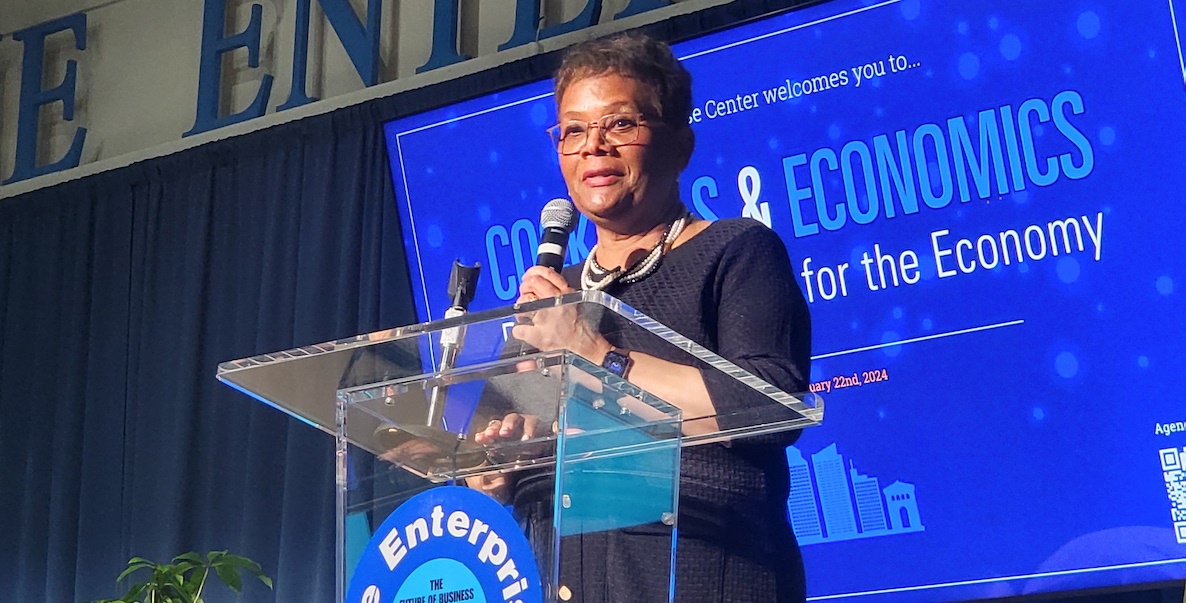“Businesses in this room, I want to apologize to you,” Della Clark said on a recent Thursday night to a packed room of Black and Brown entrepreneurs, boldface names, and business and civic leaders. She was speaking from a makeshift stage at her Enterprise Center in West Philly, where, for the past 34 years, Clark has provided countless business services for minority entrepreneurs, from lessons in financial literacy to procurement and consulting services.
But, in the last few years, she’s had an epiphany of sorts. “For 34 years, we’ve been focused on programs,” Clark told the rapt crowd. “But the needle didn’t move, we really didn’t create the kind of wealth that we thought we should have. So as of this year, in 2024, we are embarking on a massive growth plan, and this place will become a capital and investment center going forward.”
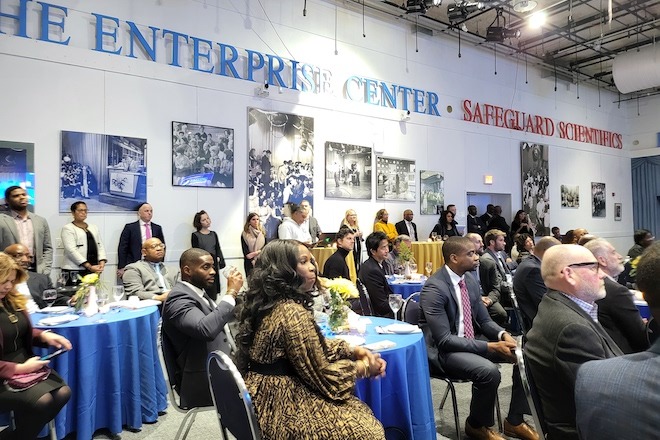
Clark’s realization? It’s about the capital, stupid! She has launched an initial $50 million Innovate Capital Growth Fund to give minority entrepreneurs access to equity investments their White and male peers have long taken advantage of through the tradition of startup “friends and family” seed round funding. And, in partnership with J.P. Morgan Chase and Comcast, she’s taking her gospel on the road — in her words, “starting a movement.” In 22 cities, her Cocktails and Economics events will convene top minority CEOs, connecting them with economists, leading investors, and business industry experts.
Women leading the way
The late February kickoff event modeled the concept. In many cities, the event will feature a celebrity like LaBelle, hawking her line of sweet potato pie and wine, with Econ 101 lessons from experts like an esteemed J.P. Morgan Chase economist and local fiscal guru Richard Vague.
It’s all part of Clark’s “show me the money” crusade. There’s nothing, she’s come to believe, that inner-city minority entrepreneurs lack other than capital — and a chance. Clark plans on playing connector, mentor, and investor. “We’re in the market right now for ambitious entrepreneurs who have growth strategies,” Clark announced to her audience. “We have capital; we’re in the market. And the goal of this movement across America is to talk about capital and bring all of these resources together, not only in Philadelphia, but in other cities across the country.”
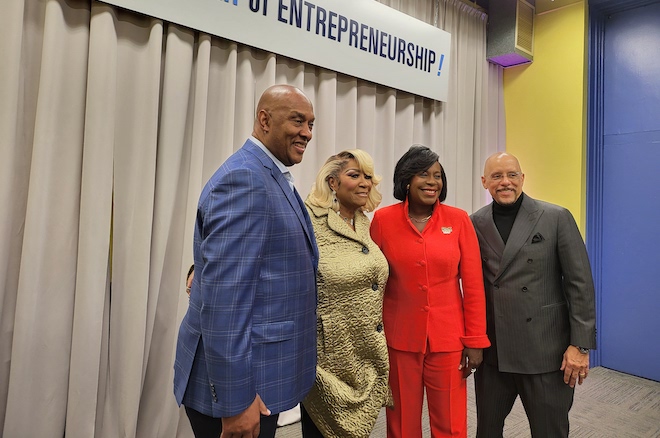
Clark is a born disruptor; speaker after speaker, including the Mayor, joked that they were in attendance because she’d asked them to be — and you deny Della at your peril. It became a running gag, only you got the sense that they weren’t totally kidding. Time and again, speakers used the name “Della” and the description “force of nature” interchangeably. Clark has engaged The Citizen to serve as the project’s media partner; we’ll be chronicling her nationwide tour.
“We don’t need a bank. We don’t need another loan, no debt. We need capital, private equity, patient capital.” — Mayor Cherelle Parker
Clark’s mission is the mission facing our city, state, and nation. When the average net worth of a White household is $117,000 and a Black household $17,000? That doesn’t just happen. As Clark has divined, such inequality is a product of decades of policy choices. The only way to reverse the trend is to unlock the floodgates of capital for minority businesses— and to educate would-be entrepreneurs on best practices so they can master the art of growth.
Proving Clark’s heft, Parker showed with her economic team in tow — all women: Rachel Branson, Director of the Office of Minority Business Success; Kafi Lindsay, Director of Strategic Partnerships, and Alba Martinez, Commerce Director.
The Mayor heaped praise on LaBelle — “When I grew up listening to your wonderful music, wow, it meant the world — and when I’m in the shower, I can Patti LaBelle” — and then, speaking to LaBelle from the stage, she tied the two-time Grammy winner’s story to Clark’s mission of setting the conditions so one’s inner entrepreneur can thrive. We think of LaBelle as the godmother of soul music, but her Good Life food products are also a $20 million annual business.
“Most entrepreneurs are not A students. Many haven’t even gone to college. Well, LeBron didn’t go to college, either. But he got the expertise, and look at him today.” — Della Clark, Enterprise Center
“Della Clark, you were so right to say Patti LaBelle is the example for us to follow as you take this model nationwide, because what you say, Patti, particularly to Black women like me and others who are similarly situated, particularly those who come from humble beginnings, you can be anything you decide to be, and never allow anyone to put you in a box and define who you should be and what you shouldn’t do,” Parker said. “So I’m excited about you being right here in the heart of West Philadelphia with the lady who’s been bossing me around for the past year, Della Clark.”
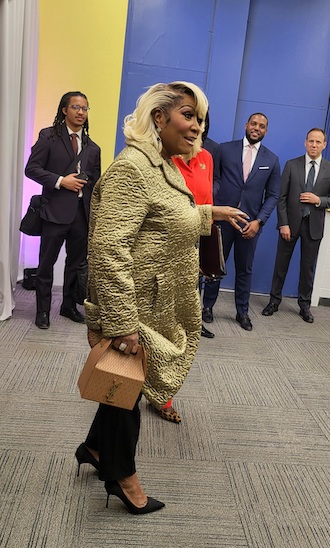
Parker closed by channeling Clark. “Della, I get it,” she said. “We don’t need a bank. We don’t need another loan, no debt. We need capital, private equity, patient capital.”
Econ 101
Soon, after remarks from State Senator Vincent Hughes and a video from Governor Shapiro, it was time for some Econ 101. In a presentation and remarks in conversation with Vague, J.P. Morgan Chase economist Jordan Jackson provided insider insights the would-be business owners in the room might otherwise have to pay for. In response to a question from Vague, Jackson made the case for equity as opposed to debt capital.
“I’ve always been of the opinion that equity capital is a vote of confidence; debt capital is a vote of condition,” he said. “For those who have taken out debt, you’ve got to post some collateral, potentially post some personal guarantees. That is in certain instances necessary, but being able to get that equity capital, right, that’s a vote of confidence. Typically, they may ask for a board of directors seat, which is fine.”
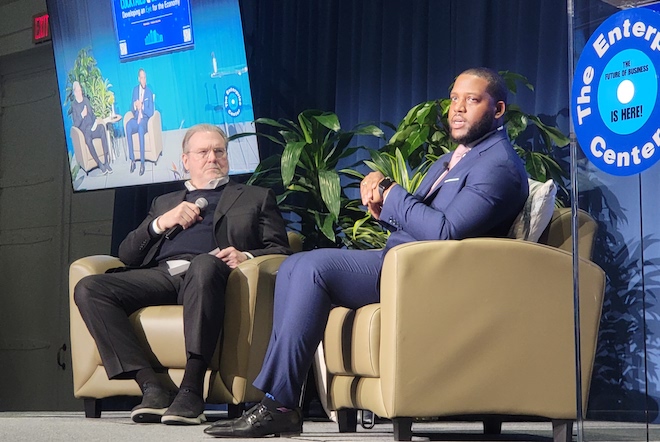
“And you’ll typically have to give up a little bit of equity. So you do limit some of your upside. But venture capitalists are still invested in the business, they want to see you succeed, they want to see the business grow, because not only does it help your business, it helps their investment as well. I recognize that early on, it’s maybe more accessible to lean on debt, with programs like micro- or SBA loans. But really, rooms like this are so impactful in allowing you all to get access to that equity capital, I think it’s so important as you think about structuring your balance sheet.”
Other tips from Jackson:
-
- Don’t expect a recession this year: “This is a very supportive backdrop for small business, not just small business creation, but small business growth.”
-
- Focus on cash flow to avoid those business “oops” factors: “This is not the late 90s and early 2000s, where you could put ‘dot-com’ at the end of your name and you could get funded. This is a very different environment. You need to have proof of cash flow.*
-
- The hottest new job? “There is going to be an explosion in what I’m calling AI consultants,” Jackson said. “I think it’s going to be an entirely new industry, folks who are going to take what AI can do and help businesses be more efficient and productive.”
Before Jackson was done, LaBelle got up to leave, but not before making her way to the stage. “I’m sorry, honey, I’ve got to go,” she said to him, reaching up for an embrace. Jackson reached down and hugged himself some royalty, and when he straightened up, his eyes were misting over. “Man,” he said, “my mama’s gonna be doing some crying tonight.”
Black entrepreneurship at its best
The room broke up, and just off the stage, there stood Della Clark, beaming. A few years ago, she explained to me the genesis of this dream. “There are two industries where African Americans have thrived, music / entertainment and sports,” she told me. “I always use sports because it translates well. You take a young man when he’s between six and 10 years old, and you get him in Little League baseball or AAU in basketball and pass him along, coach to coach. They’ll say, Larry’s a great dribbler, but he’s got to work on his shot, and they’ll coach you up.”
“That doesn’t happen in entrepreneurship. No one says, Della’s a really good candle maker, but she’s got to learn how to read a P&L. And, remember, most entrepreneurs are not A students. Many haven’t even gone to college. Well, LeBron didn’t go to college, either. But he got the expertise, and look at him today.”
At the close of her first Cocktails and Economics event, looking at Clark survey the room, it was easy to discern what lay behind her prideful countenance. She had finally convened a roomful of entrepreneurial LeBrons, and she was finally getting them some coaching.
[Correction: An earlier version of this story misstated the name of the J.P. Morgan Chase economist. It is Jordan Jackson.]
![]() MORE ON BUSINESS AND ENTREPRENEURSHIP FROM THE CITIZEN
MORE ON BUSINESS AND ENTREPRENEURSHIP FROM THE CITIZEN



